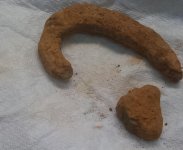Astronomersmith
Junior Member
This may be a really stupid question, but, I never claimed to be a genius.
Anyway, most of my hunting is on an old (but unfortunately not THAT old) farm with pasture/livestock land mostly, with some crops too I'm sure. That said, I dig up a lot of rusted steel "things".
Probably worthless, but I'd still like to identify them and I've posted pics here before and some friendly people have helped me out in that department. Most of them are thick with rust, and while I've helped some by 'whacking' them against each other or with a hammer, I wonder if there is another, better way?
The most interesting things have been horse shoes and possibly a couple of oxen shoes. I've beat them until I could actually see the iron of the shoe on one or two of these. I also found a one inch nut that was almost triangular with rust. I tapped on it until I found a flat edge, and figured out what it was.
BTW, on this picture I've attached, showing that nut, and a horseshoe (I assume?)....can you tell me if it appears bent, or could a horses hoof be that narrow? Just wondering?
Also, I didn't put any measurements on this pic...sorry, I thought about it right after I uploaded it! The horseshoe over all length is 3.75" x 2.75", and the nut (rust and all) is 1.5" x 1.0".
So, are there any awesome and amazing tricks of the trade, on BAD rust removal, that I might be able to try? One guy told me, use a sandblaster. Well, not doable, because I don't have access to one. Other suggestions?
Thanks,
Scott
Anyway, most of my hunting is on an old (but unfortunately not THAT old) farm with pasture/livestock land mostly, with some crops too I'm sure. That said, I dig up a lot of rusted steel "things".
Probably worthless, but I'd still like to identify them and I've posted pics here before and some friendly people have helped me out in that department. Most of them are thick with rust, and while I've helped some by 'whacking' them against each other or with a hammer, I wonder if there is another, better way?
The most interesting things have been horse shoes and possibly a couple of oxen shoes. I've beat them until I could actually see the iron of the shoe on one or two of these. I also found a one inch nut that was almost triangular with rust. I tapped on it until I found a flat edge, and figured out what it was.
BTW, on this picture I've attached, showing that nut, and a horseshoe (I assume?)....can you tell me if it appears bent, or could a horses hoof be that narrow? Just wondering?
Also, I didn't put any measurements on this pic...sorry, I thought about it right after I uploaded it! The horseshoe over all length is 3.75" x 2.75", and the nut (rust and all) is 1.5" x 1.0".
So, are there any awesome and amazing tricks of the trade, on BAD rust removal, that I might be able to try? One guy told me, use a sandblaster. Well, not doable, because I don't have access to one. Other suggestions?
Thanks,
Scott


